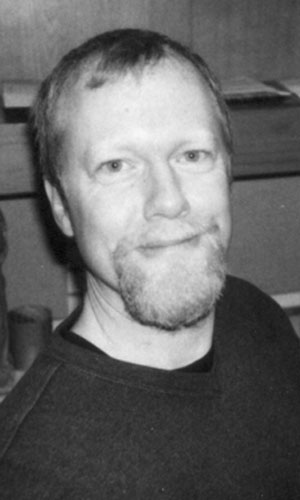DO-IT Staff Profile
Hi. I'm Terry. I'm a technology specialist. As an undergrad at Purdue University (one of the elite technology schools in the United States), I only took one computer course. I was one of a small minority of Purdue students who majored in psychology. It wasn't long though before I discovered technology.

Fresh out of college, I loaded the hatchback of my compact car with my backpack and hiking boots, guitar, books, and a couple changes of clothes, and I moved to Lawrence, Kansas. There, I commuted to neighboring Topeka and worked as a research assistant for a federally funded child development project at the Menninger Foundation. This project was doing an amazing amount of data analysis, all by hand. I didn't find this at all pleasurable, so I took it upon myself to learn how computers could benefit the project. Our IBM PC XT running MS DOS 3.2 was the talk of the institution; people came from all over to sample this amazing new technology. In four years, I became proficient enough with computer hardware and software that when our research grant ended, I was able to migrate into the Kansas City corporate world doing computer work. As a corporate computing guy, I was constantly learning about cutting edge technologies, but I didn't feel my work was beneficial to anyone other than a few executives.
So in the early nineties, I accepted a lower paying but more intrinsically rewarding position as coordinator of the computer training program at the Independent Living Center (ILC) in Lawrence. We had an awesome computer lab—10 PCs equipped with a full spectrum of assistive technologies. During an average month we had over 50 people use the lab either for formal classes or just to learn new skills on their own. We also networked quite a bit with the local business community, so folks could get employed utilizing their new skills. This was where I first learned of the DO-IT program. We were impressed with what DO-IT was doing, and on a smaller scale began incorporating some of their practices (mentoring, job shadowing, etc.) into the work that we were doing. The ILC position also involved quite a bit of outreach and advocacy. I worked throughout Kansas with postsecondary education entities, businesses and government, teaching them how to make their technology accessible, and how to design Web pages that are accessible to all users.
After 12 years in Lawrence, I decided to apply my technology accessibility knowledge to higher education, where I hoped to have a significant impact on the accessibility of a major postsecondary learning institution. The institution I chose, and the one that chose me, was North Carolina State University. I spent the next couple of years in Raleigh/Durham, working as the coordinator of assistive and information technology at NC State. Most positions of this type are established within either the disability services or central computing offices. However, in this position I reported equally to both units. My role was to bridge between the two groups to facilitate effective collaboration.
Although I enjoyed my work at NC State, in November 2001 I again took to the highway, this time with much more stuff packed into a moving truck, and drove from North Carolina to Washington, where I had accepted my current position with DO-IT. Now, as technology specialist, my time is divided between two programs. The National Center on Accessible Information Technology in Education (AccessIT) is a collaborative project co-sponsored by DO-IT. The mission of AccessIT is to promote the use of accessible electronic and information technology for students and employees in educational institutions at all academic levels. The Northwest Alliance for Access to Science, Technology, Engineering and Mathematics (AccessSTEM) is DO-IT's newest project. The purpose of this alliance is to increase the participation of people with disabilities in STEM careers.
In both of these programs, my role is to develop Web content, develop training materials, provide instruction and technical assistance, research policies, and generally help in any way I can to support the programs. These efforts also support my personal goal to help society utilize technology in ways that are effective, usable, and accessible for everyone.